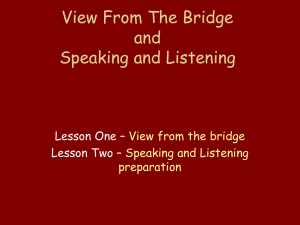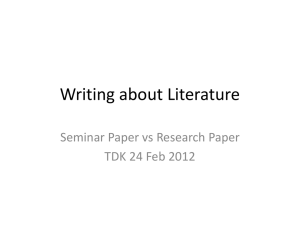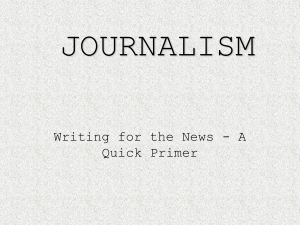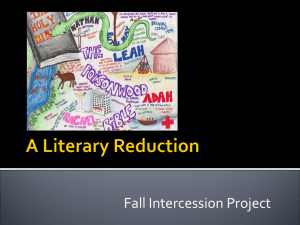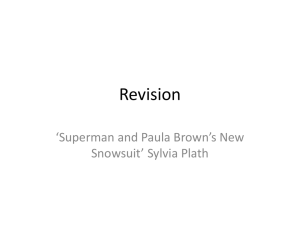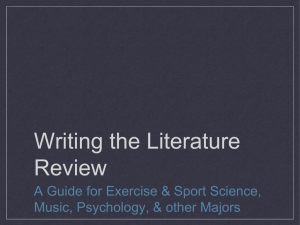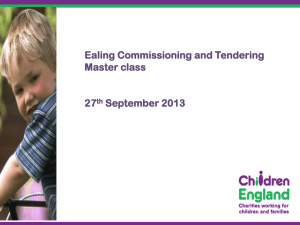Quotations, Contracts and Tenders Presentation by Simon Gresham
advertisement
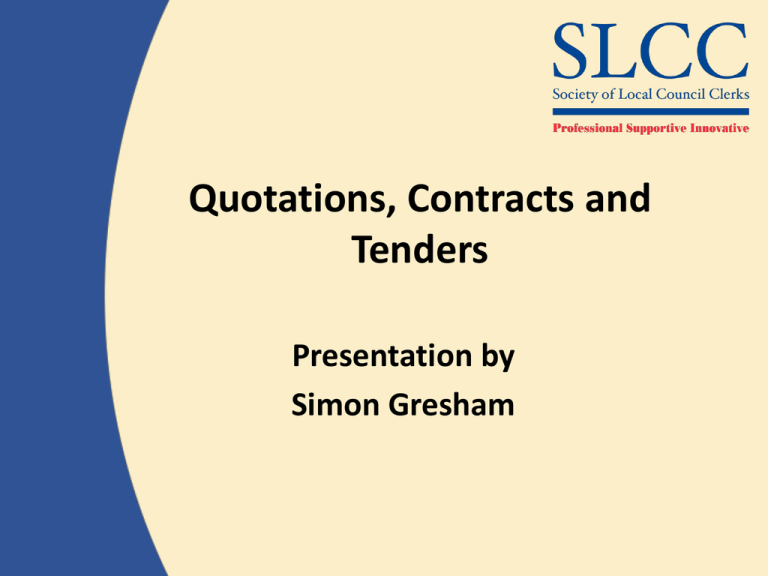
Quotations, Contracts and Tenders Presentation by Simon Gresham About Me • 30 years working in contracting environment • Started in catering • Worked on first local authority compulsory competitive tendering • Moved on to market testing of central government services • Worked on major accommodation PFIs • Advisor to a range of clients and contractors • Now advise on small and large procurements mainly covering facilities management • Live in Norfolk Current Agenda? • Drive for savings • Local services passed down to Town/Parish Councils • More outsourcing of non core/back office services to save money • Debate – in house or private sector – which is best? Are there alternatives? Current Agenda? • • • • Joined up services Linking with other Authorities Joint Ventures Greater use of the voluntary sector (The Big Society?) • More resident involvement/views • More reporting – greater visibility and accountability Current Issues • • • • • • • • • Standing orders being reviewed Updates in contracting procedures Difficulties finding contractors Too many contractors? Deciding who to invite – shortlisting OJEU TUPE Specifications and documents Evaluation of bids Do you have any current issues? Ground Rules • • • • • • Be clear about the process you are adopting Be clear about Standing Orders and internal Council processes Involve the right people in the Council Examine the feasibility Gather the user’s requirements so that you get want you want Make sure you get something back from the supplier that shows they can deliver and for what price • Evaluate the proposals on a like for like basis • Manage the arrangement once you have agreed it Definition: Quotations • Used for smaller procurements – check Standing Orders regarding de-minimis levels • Follows same processes as tendering: – – – – – Prepare a brief (Specification) Invite a number (3 or more) to put in quotations/proposals Evaluate the proposals objectively Decide who to appoint Notify successful proposer and those who were unsuccessful – Letter of appointment Definition: Tendering • Used for larger scale procurements where Standing Orders would suggest that Quotations are insufficient • A more comprehensive process involving creating a specification and tender, going out to tender, evaluating the tender and then awarding a contract Definition: Contracts • The document that underpins the award of service/supply • Made up of a number of essential conditions: – – – – – – – – Contract period Parties Change Pricing Payments Personnel Disputes Termination The Overall Process Before you seek quotations or tenders Feasibility study What could we do? Competition Strategy Project Plan How could we do it? What is our plan? The Overall Process Seeking quotations/tenders Procurement Strategy How do we go about it? Specification or Brief What do we want? The Competition *External Bids *In-house Bids Let us see what is on offer? Evaluation The Overall Process After you have selected a provider The Client Side Contract Management Are we set up to manage it? Let us now manage it? Implementing the partnership Let us see how well we did? The Feasibility Study Corporate Factors Future Demand Evaluation Option Design Implementation Best Practice Market Research Feasibility Study Options • • • • • • • • • Close down Re-structure/re-organise Make internal efficiency improvements Partnering with neighbouring council - SLA Benchmark Test the market Outsource Privatise Joint venture The Project Plan Determine Service Requirements Produce Specification/ Brief Evaluate proposals Receive proposals Clarification with first choice Award the Contract Advertise the Service/Supply Receive Expressions of Interest (PQQ) Issue Invitation to Tender/ Quote Shortlist Providers Start the Contract Manage the Contract Procurement Principles • Competition is invited • Advertisement • EU Directive application – use of OJEU (Official Journal of the European Union) • Canvass the market • Seek quotations • Suppliers are shortlisted against stated criteria • Pre Qualification Questionnaire (PQQ) • Capability and track record • Financial health • Contract packaging • Contract period Other Key Questions • Does TUPE (Transfer of Undertakings Protection of Employment Regulations) apply? • If it does, how does it apply? • How are pensions to be dealt with? • How will you deal with change (e.g. technology refresh)? • Do you share savings? • What is Quality and how to be dealt with? Specifications •Input versus Output •Can you ever achieve a totally output based approach? •What do contractors think? •What are your ‘Imperatives’? •If you go for an output approach, do you accept the risks? Specification Contents 1. Introduction / Background 2. Service Requirements 3. Service Standards 4. Supporting Appendices/Data/Fact Sheets The Invitation to Tender/ Provide Quotations • • • • • Letter of invitation with instructions Draft Contract Conditions Specification/Brief Tender/Quotation Response document Evaluation criteria and weighting for quality and price Evaluation The Principles • • • • • Fair and even - select the right team Compare like with like - develop the right process Look at quality as well as cost Develop a model Develop a risk register Example Evaluation Criteria M.E.A.T. - Most Economically Advantageous Tender A: Full Economic Cost B: Service Delivery quality C: Service Management quality D: Approach to people issues E: Implementation approach F: Flexibility for the future G: Synergy with client H: Commercial/contract terms Mobilisation Activities • • • • • • Staffing and communications (TUPE) Recruitment and training Pricing and payments Contractual and relationship (reporting) Assets and infrastructure Implementation (may be over time rather than immediately) Managing the Contract What do you need to make it work? • • • • A clear specification Sensible hand-over arrangements Effective communications Recognition of teething problems Managing the Contract • • • • • • Clairvoyant contractors do not exist Ill informed clients tend to get annoyed Avoid the ‘them’ and ‘us’ mentality Be consistent Avoid personality clashes Develop the relationship Quotations, Contracts and Tenders Clinic – Your Questions Answered? Jargon – is there any jargon still unclear? For further information about Quotations, Contracts and Tenders please feel free to contact Simon Gresham on simongresham@btinternet.com or 07798 623750
